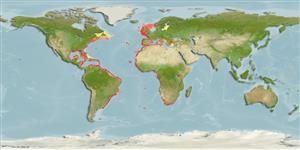Common names from other countries
分类 / Names
俗名 | 同种异名 | Catalog of Fishes(属, 种) | ITIS | CoL | WoRMS | Cloffa
Teleostei >
Scombriformes (Mackerels) >
Scombridae (Mackerels, tunas, bonitos) > Scombrinae
Etymology: Sarda: Latin and Greek, sarda = sardine; name related to the island of Sardinia (Ref. 45335).
More on author: Bloch.
Environment: milieu / climate zone / depth range / distribution range
生态学
海洋; 半咸淡水; 海洋洄游的 (Ref. 51243); 深度上下限 80 - 200 m (Ref. 5377). 亞熱帶的; 12°C - 27°C (Ref. 168); 62°N - 40°S, 98°W - 42°E (Ref. 54865)
Eastern Atlantic: Oslo, Norway to Port Elizabeth, South Africa. Also known from the Mediterranean and Black Sea. Western Atlantic: Nova Scotia, Canada to Florida, USA and northern Gulf of Mexico; then from Colombia, Venezuela, and south of the Amazon River to northern Argentina; apparently absent from most of the Caribbean Sea.
東大西洋: 奧斯陸,挪威到南非的伊莉莎白港。 也已知來自地中海與黑海。 西大西洋: 到美國的佛羅里達與墨西哥灣北部的加拿大的新斯科舍省; 然後從亞馬遜河到阿根廷北部哥倫比亞,委內瑞拉與南方; 顯然地大部分的加勒比海沒有出現。
Length at first maturity / 大小 / 重量 / 年龄
Maturity: Lm 37.8, range 41 - ? cm
Max length : 91.4 cm FL 雄鱼/尚未辨别雌雄; (Ref. 168); common length : 50.0 cm FL 雄鱼/尚未辨别雌雄; (Ref. 168); 最大体重: 11.0 kg (Ref. 40637); 最大年龄: 5 年 (Ref. 29114)
背棘 (总数) : 20 - 23; 背的软条 (总数) : 15 - 18; 臀棘: 0; 臀鳍软条: 14 - 17; 脊椎骨: 50 - 55. Mouth moderately large. Laminae of olfactory rosette 21-39. Interpelvic process small and bifid. Body completely covered with very small scales posterior to the corselet. Swim bladder absent. Spleen large. Liver with elongate left and right lobe and short middle lobe. Oblique dorsal stripes with a greater angle than in other species of Sarda.
嘴普通大的。 嗅觉毛簇 21-39 的叶片. 腹鳍间的突起小而两裂的。 身体完全地覆盖着了最小鳞片在甲胄后面。 泳鳔不存在。 脾脏大的。 肝脏有细长的左边与右边的叶与短的中央叶。 斜的背部斑纹具有一个较大的角超过在其他种的 Sarda 中.
Epipelagic, neritic and schooling species that may enter estuaries. Known to be cannibalistic, adults prey on small schooling fishes, invertebrates like squid and shrimps and can swallow relatively large prey. Eggs and larvae pelagic (Ref. 6769). Utilized fresh, dried or salted, smoked, canned and frozen (Ref. 9987). Able to adapt to different temperatures 12° to 27°C and salinities 14 to 39 (Ref. 36731).
表层带, 可能进入河口的浅海与群游性种。 已知是同类相食的, 成鱼捕食小的群游性鱼, 像乌贼与虾一样的无脊椎动物而且能吞相当大的猎物。 生鲜使用, 乾燥或盐腌, 烟熏, 罐装及冷冻.(参考文献 9987) 能适应不同的温度 12 对 27 °C 与盐度的 ° 14 到 39.(参考文献 36731)
東大西洋: 奧斯陸,挪威到南非的伊莉莎白港。 也已知來自地中海與黑海。 西大西洋: 到美國的佛羅里達與墨西哥灣北部的加拿大的新斯科舍省; 然後從亞馬遜河到阿根廷北部哥倫比亞,委內瑞拉與南方; 顯然地大部分的加勒比海沒有出現。
Collette, B.B. and C.E. Nauen, 1983. FAO Species Catalogue. Vol. 2. Scombrids of the world. An annotated and illustrated catalogue of tunas, mackerels, bonitos and related species known to date. Rome: FAO. FAO Fish. Synop. 125(2):137 p. (Ref. 168)
CITES (Ref. 128078)
Not Evaluated
人类利用
渔业: 高经济性; 游钓鱼种: 是的
工具
特别资料
下载 XML
网络资源
Estimates based on models
Preferred temperature (Ref.
115969): 7 - 23.4, mean 10.7 (based on 346 cells).
Phylogenetic diversity index (Ref.
82804): PD
50 = 0.5312 [Uniqueness, from 0.5 = low to 2.0 = high].
Bayesian length-weight: a=0.00871 (0.00764 - 0.00993), b=3.06 (3.02 - 3.10), in cm Total Length, based on LWR estimates for this species (Ref.
93245).
营养阶层 (Ref.
69278): 4.5 ±0.0 se; based on diet studies.
回复力 (Ref.
120179): 中等的, 族群倍增时间最少 1.4 - 4.4年 (K=0.13-0.24; tm=1; tmax=5).
Prior r = 0.57, 95% CL = 0.37 - 0.85, Based on 9 data-limited stock assessments.
Fishing Vulnerability (Ref.
59153): Low to moderate vulnerability (33 of 100).
Climate Vulnerability (Ref.
125649): Moderate to high vulnerability (48 of 100).
